哈佛是一所失去灵魂的大学
- 格式:doc
- 大小:79.00 KB
- 文档页数:4
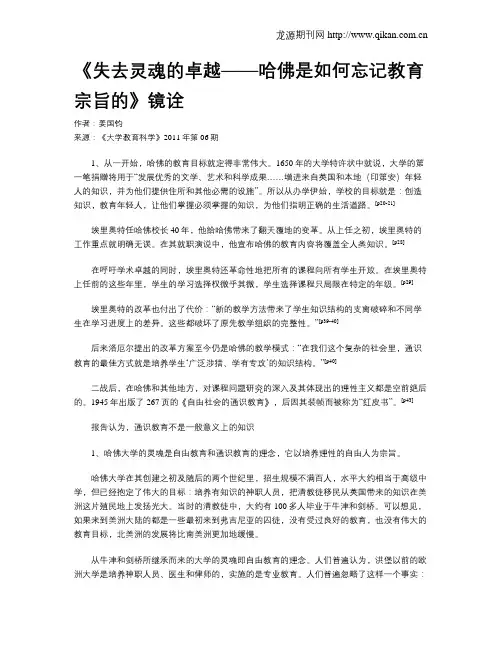
《失去灵魂的卓越——哈佛是如何忘记教育宗旨的》镜诠作者:姜国钧来源:《大学教育科学》2011年第06期1、从一开始,哈佛的教育目标就定得非常伟大。
1650年的大学特许状中就说,大学的第一笔捐赠将用于“发展优秀的文学、艺术和科学成果……增进来自英国和本地(印第安)年轻人的知识,并为他们提供住所和其他必需的设施”。
所以从办学伊始,学校的目标就是:创造知识,教育年轻人,让他们掌握必须掌握的知识,为他们指明正确的生活道路。
[p20-21]埃里奥特任哈佛校长40年,他给哈佛带来了翻天覆地的变革。
从上任之初,埃里奥特的工作重点就明确无误。
在其就职演说中,他宣布哈佛的教育内容将覆盖全人类知识。
[p28]在呼吁学术卓越的同时,埃里奥特还革命性地把所有的课程向所有学生开放。
在埃里奥特上任前的这些年里,学生的学习选择权微乎其微,学生选择课程只局限在特定的年级。
[p29]埃里奥特的改革也付出了代价:“新的教学方法带来了学生知识结构的支离破碎和不同学生在学习进度上的差异。
这些都破坏了原先教学组织的完整性。
”[p39-40]后来洛厄尔提出的改革方案至今仍是哈佛的教学模式:“在我们这个复杂的社会里,通识教育的最佳方式就是培养学生‘广泛涉猎、学有专攻’的知识结构。
”[p40]二战后,在哈佛和其他地方,对课程问题研究的深入及其体现出的理性主义都是空前绝后的。
1945年出版了267页的《自由社会的通识教育》,后因其装帧而被称为“红皮书”。
[p43]报告认为,通识教育不是一般意义上的知识1、哈佛大学的灵魂是自由教育和通识教育的理念,它以培养理性的自由人为宗旨。
哈佛大学在其创建之初及随后的两个世纪里,招生规模不满百人,水平大约相当于高级中学,但已经抱定了伟大的目标:培养有知识的神职人员,把清教徒移民从英国带来的知识在美洲这片殖民地上发扬光大。
当时的清教徒中,大约有100多人毕业于牛津和剑桥。
可以想见,如果来到美洲大陆的都是一些最初来到弗吉尼亚的囚徒,没有受过良好的教育,也没有伟大的教育目标,北美洲的发展将比南美洲更加地缓慢。
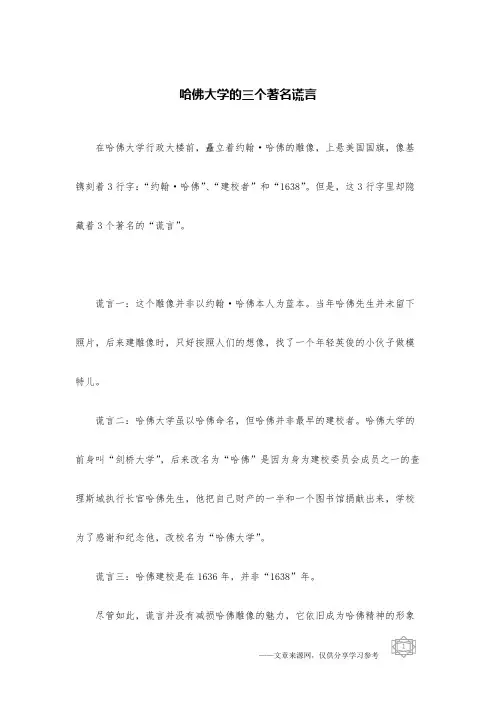
哈佛大学的三个著名谎言
在哈佛大学行政大楼前,矗立着约翰·哈佛的雕像,上悬美国国旗,像基镌刻着3行字:“约翰·哈佛”、“建校者”和“1638”。
但是,这3行字里却隐藏着3个著名的“谎言”。
谎言一:这个雕像并非以约翰·哈佛本人为蓝本。
当年哈佛先生并未留下照片,后来建雕像时,只好按照人们的想像,找了一个年轻英俊的小伙子做模特儿。
谎言二:哈佛大学虽以哈佛命名,但哈佛并非最早的建校者。
哈佛大学的前身叫“剑桥大学”,后来改名为“哈佛”是因为身为建校委员会成员之一的查理斯城执行长官哈佛先生,他把自己财产的一半和一个图书馆捐献出来,学校为了感谢和纪念他,改校名为“哈佛大学”。
谎言三:哈佛建校是在1636年,并非“1638”年。
尽管如此,谎言并没有减损哈佛雕像的魅力,它依旧成为哈佛精神的形象
展示:奋进、自信、博大。
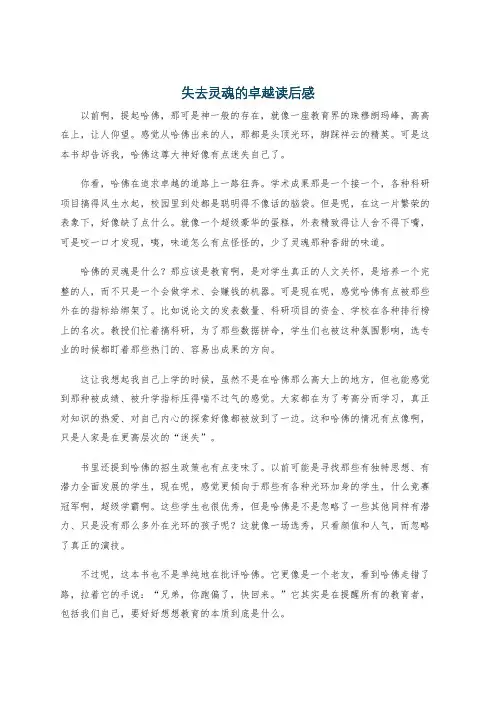
失去灵魂的卓越读后感以前啊,提起哈佛,那可是神一般的存在,就像一座教育界的珠穆朗玛峰,高高在上,让人仰望。
感觉从哈佛出来的人,那都是头顶光环,脚踩祥云的精英。
可是这本书却告诉我,哈佛这尊大神好像有点迷失自己了。
你看,哈佛在追求卓越的道路上一路狂奔。
学术成果那是一个接一个,各种科研项目搞得风生水起,校园里到处都是聪明得不像话的脑袋。
但是呢,在这一片繁荣的表象下,好像缺了点什么。
就像一个超级豪华的蛋糕,外表精致得让人舍不得下嘴,可是咬一口才发现,咦,味道怎么有点怪怪的,少了灵魂那种香甜的味道。
哈佛的灵魂是什么?那应该是教育啊,是对学生真正的人文关怀,是培养一个完整的人,而不只是一个会做学术、会赚钱的机器。
可是现在呢,感觉哈佛有点被那些外在的指标给绑架了。
比如说论文的发表数量、科研项目的资金、学校在各种排行榜上的名次。
教授们忙着搞科研,为了那些数据拼命,学生们也被这种氛围影响,选专业的时候都盯着那些热门的、容易出成果的方向。
这让我想起我自己上学的时候,虽然不是在哈佛那么高大上的地方,但也能感觉到那种被成绩、被升学指标压得喘不过气的感觉。
大家都在为了考高分而学习,真正对知识的热爱、对自己内心的探索好像都被放到了一边。
这和哈佛的情况有点像啊,只是人家是在更高层次的“迷失”。
书里还提到哈佛的招生政策也有点变味了。
以前可能是寻找那些有独特思想、有潜力全面发展的学生,现在呢,感觉更倾向于那些有各种光环加身的学生,什么竞赛冠军啊,超级学霸啊。
这些学生也很优秀,但是哈佛是不是忽略了一些其他同样有潜力、只是没有那么多外在光环的孩子呢?这就像一场选秀,只看颜值和人气,而忽略了真正的演技。
不过呢,这本书也不是单纯地在批评哈佛。
它更像是一个老友,看到哈佛走错了路,拉着它的手说:“兄弟,你跑偏了,快回来。
”它其实是在提醒所有的教育者,包括我们自己,要好好想想教育的本质到底是什么。
对于我来说,读完这本书最大的收获就是,我们不能只看那些表面的成功。
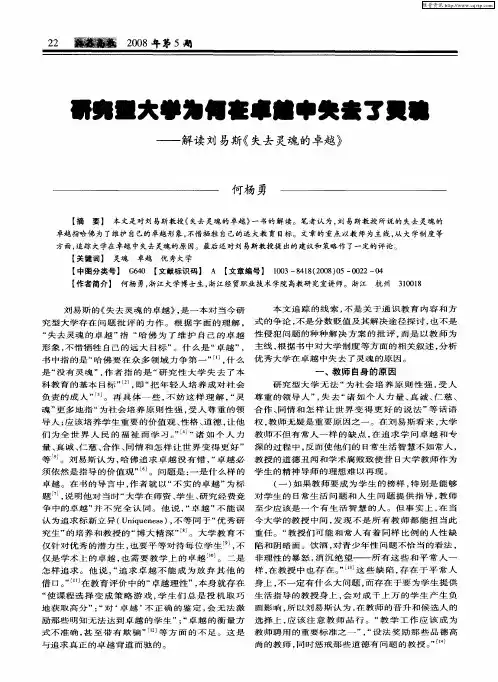
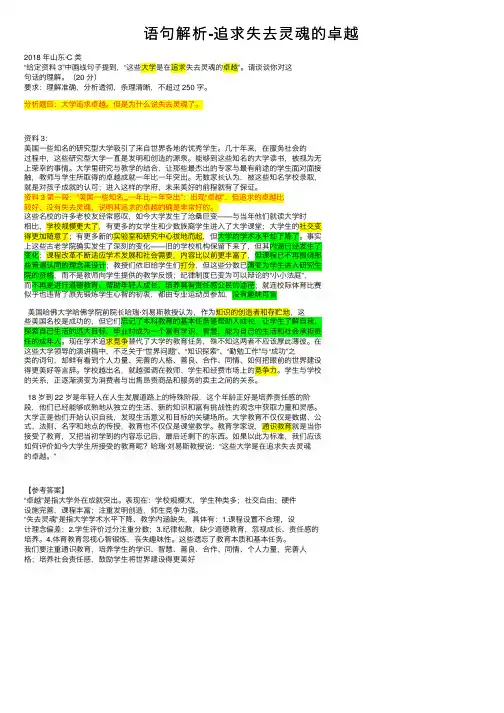
语句解析-追求失去灵魂的卓越2018 年⼭东·C 类“给定资料 3”中画线句⼦提到,“这些⼤学是在追求失去灵魂的卓越”。
请谈谈你对这句话的理解。
(20 分)要求:理解准确,分析透彻,条理清晰,不超过 250 字。
分析题⽬:⼤学追求卓越。
但是为什么说失去灵魂了。
资料 3:美国⼀些知名的研究型⼤学吸引了来⾃世界各地的优秀学⽣。
⼏⼗年来,在服务社会的过程中,这些研究型⼤学⼀直是发明和创造的源泉。
能够到这些知名的⼤学读书,被视为⽆上荣幸的事情。
⼤学⾥研究与教学的结合,让那些最杰出的专家与最有前途的学⽣⾯对⾯接触,教师与学⽣所取得的卓越成就⼀年⽐⼀年突出。
⽆数家长认为,被这些知名学校录取,就是对孩⼦成就的认可;进⼊这样的学府,未来美好的前程就有了保证。
资料 3 第⼀段:“美国⼀些知名……⼀年⽐⼀年突出”:出现“卓越”,但追求的卓越⽐较好、没有失去灵魂,说明其追求的卓越的确是⾮常好的。
这些名校的许多⽼校友经常感叹,如今⼤学发⽣了沧桑巨变——与当年他们就读⼤学时相⽐,学校规模更⼤了,有更多的⼥学⽣和少数族裔学⽣进⼊了⼤学课堂;⼤学⽣的社交变得更加随意了;有更多新的实验室和研究中⼼拔地⽽起,但⼤学的学术⽔平却下降了。
事实上这些古⽼学院确实发⽣了深刻的变化——旧的学校机构保留下来了,但其内涵已经发⽣了变化:课程改⾰不断适应学术发展和社会需要,内容⽐以前更丰富了,但课程已不再围绕那些普遍认同的理念来设计;教授们依旧给学⽣们打分,但这些分数已演变为学⽣进⼊研究⽣院的资格,⽽不是教师向学⽣提供的教学反馈;纪律制度已变为可以辩论的“⼩⼩法庭”,⽽不再是进⾏道德教育、帮助年轻⼈成长、培养具有责任感公民的途径;就连校际体育⽐赛似乎也违背了原先锻炼学⽣⼼智的初衷,都由专业运动员参加,没有趣味可⾔美国哈佛⼤学哈佛学院前院长哈瑞·刘易斯教授认为,作为知识的创造者和存贮地,这些美国名校是成功的,但它们忘记了本科教育的基本任务是帮助⼈成长,让学⽣了解⾃我、探索⾃⼰⽣活的远⼤⽬标,毕业时成为⼀个富有学识、智慧,能为⾃⼰的⽣活和社会承担责任的成年⼈。
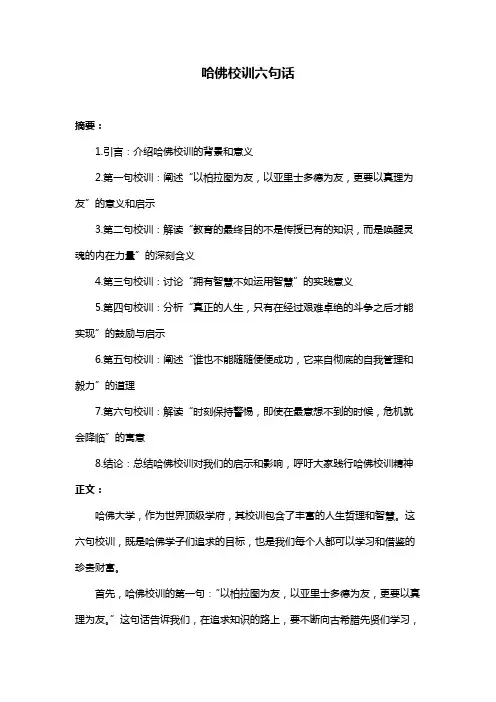
哈佛校训六句话摘要:1.引言:介绍哈佛校训的背景和意义2.第一句校训:阐述“以柏拉图为友,以亚里士多德为友,更要以真理为友”的意义和启示3.第二句校训:解读“教育的最终目的不是传授已有的知识,而是唤醒灵魂的内在力量”的深刻含义4.第三句校训:讨论“拥有智慧不如运用智慧”的实践意义5.第四句校训:分析“真正的人生,只有在经过艰难卓绝的斗争之后才能实现”的鼓励与启示6.第五句校训:阐述“谁也不能随随便便成功,它来自彻底的自我管理和毅力”的道理7.第六句校训:解读“时刻保持警惕,即使在最意想不到的时候,危机就会降临”的寓意8.结论:总结哈佛校训对我们的启示和影响,呼吁大家践行哈佛校训精神正文:哈佛大学,作为世界顶级学府,其校训包含了丰富的人生哲理和智慧。
这六句校训,既是哈佛学子们追求的目标,也是我们每个人都可以学习和借鉴的珍贵财富。
首先,哈佛校训的第一句:“以柏拉图为友,以亚里士多德为友,更要以真理为友。
”这句话告诉我们,在追求知识的路上,要不断向古希腊先贤们学习,尊重并追求真理。
只有这样,我们才能在不断探索中丰富自己的内心世界。
第二句校训:“教育的最终目的不是传授已有的知识,而是唤醒灵魂的内在力量。
”这句话深刻地揭示了教育的本质,那就是激发学生的内在潜力,让他们在自主学习、独立思考的过程中,不断成长和进步。
第三句校训:“拥有智慧不如运用智慧。
”智慧是用来解决实际问题的,而不是用来炫耀的。
我们应该把智慧运用到生活中,使之成为我们解决困难的利器。
第四句校训:“真正的人生,只有在经过艰难卓绝的斗争之后才能实现。
”这句话鼓励我们要勇敢面对生活中的挑战和困难,以坚定的信念和毅力去战胜它们,从而成就精彩的人生。
第五句校训:“谁也不能随随便便成功,它来自彻底的自我管理和毅力。
”成功不是偶然的,而是源于我们对自己的严格要求和坚定信念。
只有不断自我提升,才能走向成功。
最后一句校训:“时刻保持警惕,即使在最意想不到的时候,危机就会降临。
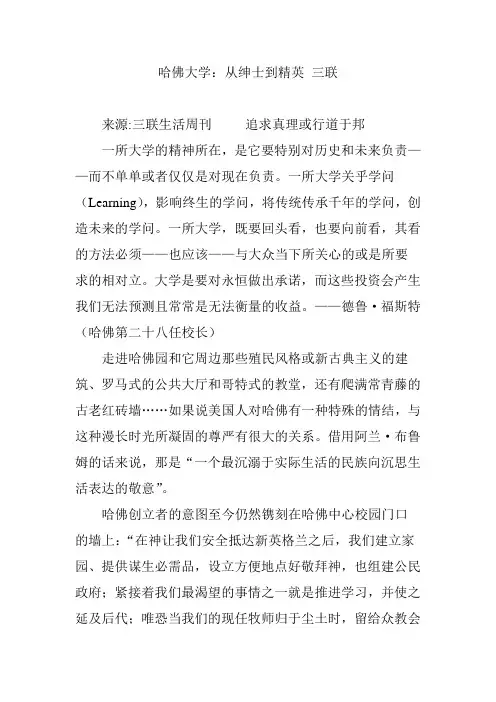
哈佛大学:从绅士到精英三联来源:三联生活周刊追求真理或行道于邦一所大学的精神所在,是它要特别对历史和未来负责——而不单单或者仅仅是对现在负责。
一所大学关乎学问(Learning),影响终生的学问,将传统传承千年的学问,创造未来的学问。
一所大学,既要回头看,也要向前看,其看的方法必须——也应该——与大众当下所关心的或是所要求的相对立。
大学是要对永恒做出承诺,而这些投资会产生我们无法预测且常常是无法衡量的收益。
——德鲁·福斯特(哈佛第二十八任校长)走进哈佛园和它周边那些殖民风格或新古典主义的建筑、罗马式的公共大厅和哥特式的教堂,还有爬满常青藤的古老红砖墙……如果说美国人对哈佛有一种特殊的情结,与这种漫长时光所凝固的尊严有很大的关系。
借用阿兰·布鲁姆的话来说,那是“一个最沉溺于实际生活的民族向沉思生活表达的敬意”。
哈佛创立者的意图至今仍然镌刻在哈佛中心校园门口的墙上:“在神让我们安全抵达新英格兰之后,我们建立家园、提供谋生必需品,设立方便地点好敬拜神,也组建公民政府;紧接着我们最渴望的事情之一就是推进学习,并使之延及后代;唯恐当我们的现任牧师归于尘土时,留给众教会的是一群茫然无知的牧师。
”当时,乘“五月花号”客船的102名乘客经过两个多月的海上颠簸,于1620年初冬抵达北美大陆,因为艰苦和疾病,仅有53人活到了第二年的初冬。
这些定居新大陆荒野中的第一批移民如此深信教育对他们决心创立的美好社会的重要性,16年后,他们就在一条叫牛津的破街上建造了哈佛学院。
140年后,这个世界上才有了美国。
在《哈佛世纪——锻造一所国家大学》中,作者理查德·诺顿·史密斯认为:“哈佛的创办为美国建立了自己的大学传统,这是它真正的重要性。
到美国进行独立革命,摆脱英国的统治时,每个重要城镇和差不多每个教派也都有了学院。
有些人认为这是危险的趋向,是美国在学校方面重量不重质倾向的开端。
可是后来进修高等教育的方便所带来的好处,要比入学较难的大学制度保持极高标准的好处有价值得多:它鼓励多样化,使美国社会不至于产生单一而狭窄的受教育阶级。
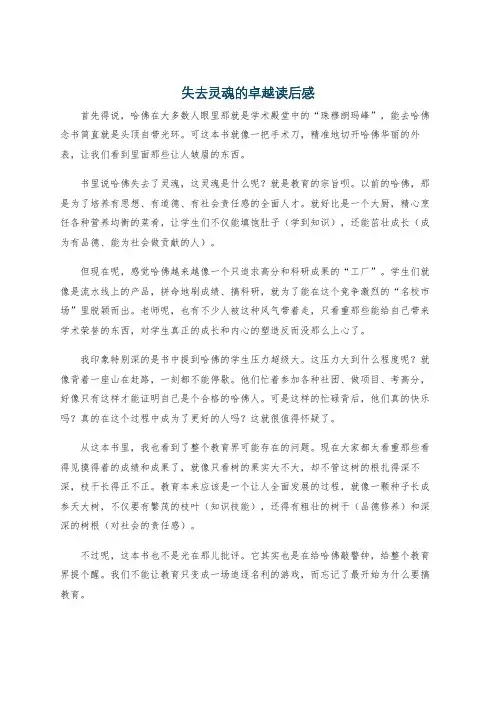
失去灵魂的卓越读后感首先得说,哈佛在大多数人眼里那就是学术殿堂中的“珠穆朗玛峰”,能去哈佛念书简直就是头顶自带光环。
可这本书就像一把手术刀,精准地切开哈佛华丽的外表,让我们看到里面那些让人皱眉的东西。
书里说哈佛失去了灵魂,这灵魂是什么呢?就是教育的宗旨呗。
以前的哈佛,那是为了培养有思想、有道德、有社会责任感的全面人才。
就好比是一个大厨,精心烹饪各种营养均衡的菜肴,让学生们不仅能填饱肚子(学到知识),还能茁壮成长(成为有品德、能为社会做贡献的人)。
但现在呢,感觉哈佛越来越像一个只追求高分和科研成果的“工厂”。
学生们就像是流水线上的产品,拼命地刷成绩、搞科研,就为了能在这个竞争激烈的“名校市场”里脱颖而出。
老师呢,也有不少人被这种风气带着走,只看重那些能给自己带来学术荣誉的东西,对学生真正的成长和内心的塑造反而没那么上心了。
我印象特别深的是书中提到哈佛的学生压力超级大。
这压力大到什么程度呢?就像背着一座山在赶路,一刻都不能停歇。
他们忙着参加各种社团、做项目、考高分,好像只有这样才能证明自己是个合格的哈佛人。
可是这样的忙碌背后,他们真的快乐吗?真的在这个过程中成为了更好的人吗?这就很值得怀疑了。
从这本书里,我也看到了整个教育界可能存在的问题。
现在大家都太看重那些看得见摸得着的成绩和成果了,就像只看树的果实大不大,却不管这树的根扎得深不深,枝干长得正不正。
教育本来应该是一个让人全面发展的过程,就像一颗种子长成参天大树,不仅要有繁茂的枝叶(知识技能),还得有粗壮的树干(品德修养)和深深的树根(对社会的责任感)。
不过呢,这本书也不是光在那儿批评。
它其实也是在给哈佛敲警钟,给整个教育界提个醒。
我们不能让教育只变成一场追逐名利的游戏,而忘记了最开始为什么要搞教育。
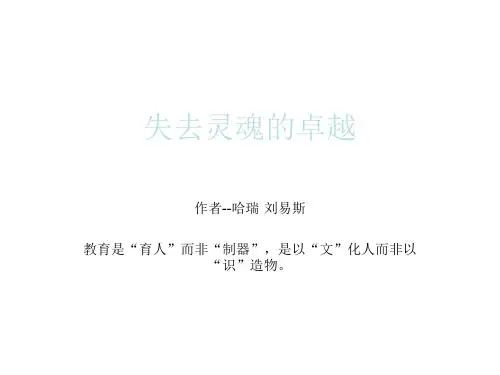
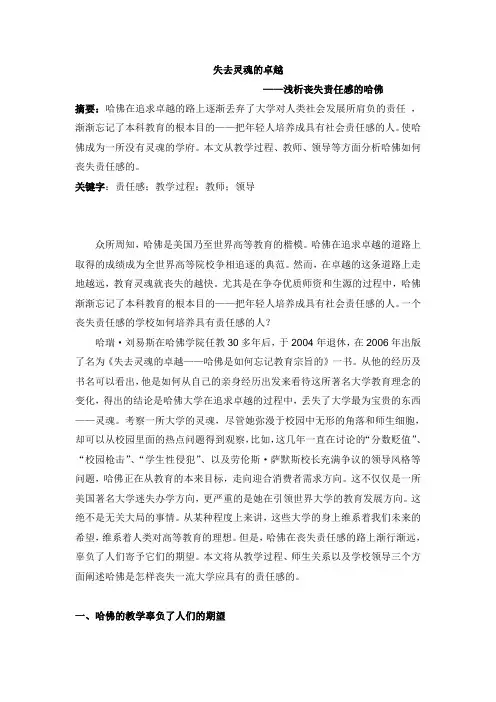
失去灵魂的卓越——浅析丧失责任感的哈佛摘要:哈佛在追求卓越的路上逐渐丢弃了大学对人类社会发展所肩负的责任,渐渐忘记了本科教育的根本目的——把年轻人培养成具有社会责任感的人。
使哈佛成为一所没有灵魂的学府。
本文从教学过程、教师、领导等方面分析哈佛如何丧失责任感的。
关键字:责任感;教学过程;教师;领导众所周知,哈佛是美国乃至世界高等教育的楷模。
哈佛在追求卓越的道路上取得的成绩成为全世界高等院校争相追逐的典范。
然而,在卓越的这条道路上走地越远,教育灵魂就丧失的越快。
尤其是在争夺优质师资和生源的过程中,哈佛渐渐忘记了本科教育的根本目的——把年轻人培养成具有社会责任感的人。
一个丧失责任感的学校如何培养具有责任感的人?哈瑞·刘易斯在哈佛学院任教30多年后,于2004年退休,在2006年出版了名为《失去灵魂的卓越——哈佛是如何忘记教育宗旨的》一书。
从他的经历及书名可以看出,他是如何从自己的亲身经历出发来看待这所著名大学教育理念的变化,得出的结论是哈佛大学在追求卓越的过程中,丢失了大学最为宝贵的东西——灵魂。
考察一所大学的灵魂,尽管她弥漫于校园中无形的角落和师生细胞,却可以从校园里面的热点问题得到观察,比如,这几年一直在讨论的“分数贬值”、“校园枪击”、“学生性侵犯”、以及劳伦斯·萨默斯校长充满争议的领导风格等问题,哈佛正在从教育的本来目标,走向迎合消费者需求方向。
这不仅仅是一所美国著名大学迷失办学方向,更严重的是她在引领世界大学的教育发展方向。
这绝不是无关大局的事情。
从某种程度上来讲,这些大学的身上维系着我们未来的希望,维系着人类对高等教育的理想。
但是,哈佛在丧失责任感的路上渐行渐远,辜负了人们寄予它们的期望。
本文将从教学过程、师生关系以及学校领导三个方面阐述哈佛是怎样丧失一流大学应具有的责任感的。
一、哈佛的教学辜负了人们的期望19世纪初,伴随着文雅与实用之争,哈佛开始了漫长的通识教育发展之路。
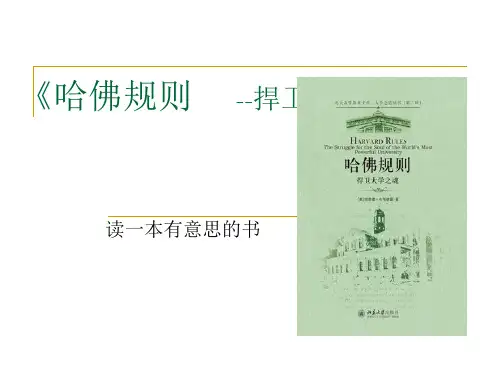
人才培养,难在何处?——读《失去灵魂的卓越》有感中国人口众多,但是大师却少之又少,曾经的大师级人物难以涌现,整个上层世界似乎都在靠老一辈的人物支撑。
试想,当这一代逝去,中国的未来又将靠哪些人来支撑?新的老一辈吗?我们并非不能培养出大师。
抗日战争时期的西南联大,在短短的九年之内,便为未来的中华民族培养出了一大批杰出的人才(例如邓稼先、朱光亚、郑哲敏、黄昆等)。
他们为日后中国的快速发展提供了重要的支撑,有些人至今还是其所在行业的支柱。
但是,目前中国的人才培养为何如此之难呢?也许我们可以在哈佛学院前院长哈瑞刘易斯所著书——《失去灵魂的卓越》中找到一些端倪。
作者为这本书加了一个副标题,即哈佛是如何忘记教育宗旨的。
哈佛无疑是“卓越”的,作为闻名遐迩的世界名校之一,它长居世界名校排行榜前十名,每年都吸引着大批优秀的学生前往求学。
但是,这所谓的“卓越”只有在拥有灵魂之后才得以成为真正的卓越,而这灵魂便是教育的宗旨。
那么,教育的宗旨是什么?以刘易斯的话说,“本科教育的基本任务是帮助十几岁的人成长为二十几岁的人”。
这个“成长”,包括了学生良好人格的养成、学识智慧的获得、未来方向的探索、对自我及生活意义的认识以及目标和责任感的形成等等。
教育的宗旨是培养人,将学生培养成一个真正的成年人,让他们拥有更多历经时间打磨之后仍能留下来的东西。
但是作为卓越大学之一的哈佛却在自身的发展中渐渐失去自己的灵魂,渐渐忘记大学的使命。
教育改革与初衷有违,本应是为适应社会和文化发展的需要而进行的改革,最终却成为尽可能满足学生和教授要求的工具;作为一种教育手段的评分制度,变得因人而异,甚至出现“分数贬值”的现象;学校作为大学生的培养环境,也未能有效地承担起它所应有的责任,校园案件难以得到妥善解决。
哈佛尚且如此,更遑论那些较为平凡的学校。
虽然人才不一定是在学校中成就的,但学校肯定是其成才过程中尤为重要的一环。
这些问题在中国的高校中或许表现的更为突出。
读《失去灵魂的卓越》有感2000字各位读友大家好,此文档由网络收集而来,欢迎您下载,谢谢读《失去灵魂的卓越》有感2000字教务处于美军《失去灵魂的卓越》,当我第一次从微信圈里一位省外大学老师给我推荐的这本书后,便再也无法忘记它。
然后我就上网购了这本书,假期期间反复了品读了两遍,感触颇深。
这本书的作者是哈佛大学的哈佛学院前任院长哈瑞·刘易斯,”失去灵魂的卓越”便是他用来评价哈佛大学的。
哈佛的卓越人所共知,但刘易斯认为:如今这所大学的办学思想中已经找不到社会责任感的存在,而古老的通识教育理想也已经有名无实,哈佛教育不再致力于解放人的思想和精神,而是重视市场名利。
它所培养的学生,尽管成绩优异,毕业后也可成为商界、政界名流,但却找不到责任感、价值观的灵魂。
书中列举了哈佛现在面临的种种问题,表明哈佛在某种程度上背离了它的办学目的。
1605年给哈佛的大学特许状言明要”发展优秀的文学、艺术和科学成果”、”创造知识,教育年轻人,让他们掌握必须掌握的知识,为他们指明正确的生活道路”.但是作者并没有自豪的告诉我们,他们的确达到了这些目标。
相反,他说建校的头200年并未创造新的知识,而只是为教会培养了新一批牧师。
而哈佛也陷入了”培养学生---学生成为老师---培养学生”的循环里,体制逐渐走向封闭。
人才培养,难在何处?——中国人口众多,但是大师却少之又少,曾经的大师级人物难以涌现,整个上层世界似乎都在靠老一辈的人物支撑。
目前中国的人才培养为何如此之难呢?也许我们可以在哈佛学院前院长哈瑞·刘易斯所著书——《失去灵魂的卓越》中找到一些端倪。
哈佛无疑是“卓越”的,作为闻名遐迩的世界名校之一,它长居世界名校排行榜前十名,每年都吸引着大批优秀的学生前往求学。
但是,这所谓的”卓越”只有在拥有灵魂之后才得以成为真正的卓越,而这灵魂便是教育的宗旨。
那么,教育的宗旨是什么?以刘易斯的话说,”本科教育的基本任务是帮助十几岁的人成长为二十几岁的人”.这个”成长”,包括了学生良好人格的养成、学识智慧的获得、未来方向的探索、对自我及生活意义的认识以及目标和责任感的形成等等。
本科教学:研究型大学的核心使命摘要:美国研究型大学面对公众对其忽视本科教学、追求“失去灵魂的卓越”的批评,开始重新审视大学理念,将本科教学作为大学的核心使命,并采取多种措施激励教师投身本科教学。
关键词:美国研究型大学;本科教学;核心使命;道德职业如何合理平衡研究和教学的关系一直是世界各国研究型大学共同面临的难题。
20世纪70-80年代,美国研究型大学由于过分偏重研究导致了本科教学质量的下降,受到了公众、政府甚至是高等教育内部的广泛质疑和批评。
哈佛学院的前任院长哈瑞·刘易斯教授就一针见血地指出:在研究型大学,学术追求替代了大学的教育任务,它们已经忘记了教育学生是其首要任务,它们正在追求一种“失去灵魂的卓越”。
卡内基教学促进基金会(以下简称“卡内基基金会”)在对全美研究型大学本科教育的状况进行广泛调查后也得出了这样的结论:“研究型大学的本科教育处于一种非常危机之中……在本科教学方面,它们做得还不够,甚至是失败的”。
面对公众批评、政府问责、家长及纳税人权利的要求,从20世纪80年代末开始,美国研究型大学开始重新审视本科教育,把本科教学作为大学的核心使命,并采取多种措施激励教师投身本科教学。
一、理念重审:满足本科教学需要的研究型大学“凡是有大学生要教育培养的地方,都必须把高质量的教学工作作为基本的要求。
”从1636年美国第一所四年制的提供学士学位的高等学校——哈佛学院创建开始,美国高校把重视教学的传统一直保持到19世纪。
1869年查尔斯·艾略特在就任哈佛大学校长的演讲中宣称,大学教授的首要工作是“系统而认真的课堂教学”。
尽管随后美国大学的重点发生了变化,为国家服务成为大学新的使命,但绝大多数大学还是把教学当作最重要的工作。
教学与研究对立则是伴随着研究型大学的诞生而出现的,芝加哥大学校长威廉·哈珀甚至明确提出教师等级和工资的提升主要取决于其研究能力,从此,“要么出版,要么死亡(publish or perish)”逐渐成为支配研究型大学及其教师工作的信条。
哈佛是一所失去灵魂的大学EXCELLENCE WITHOUT A SOULHow a Great University Forgot EducationHARRY LEWISA Harvard professor and former Dean of Harvard College offers his provocative analysis of how America's great universities are failing students and the nationAmerica's great research universities are the envy of the world—and none more so than Harvard. Never before has the competition for excellence been fiercer. But while striving to be unsurpassed in the quality of its faculty and students, Universities have forgotten that the fundamental purpose of undergraduate education is to turn young people into adults who will take responsibility for society. In Excellence Without a Soul, Harry Lewis, a Harvard professor for more than thirty years and Dean of Harvard College for eight, draws from his experience to explain how our great universities have abandoned their mission. Harvard is unique; it is the richest, oldest, most powerful university in America, and so it has set many standards, for better or worse. Lewis evaluates the failures of this grand institution—from the hot button issue of grade inflation to the recent controversy over Harvard's handling of date rape cases—and makes an impassioned argument for change. The loss of purpose in America's great colleges is not inconsequential. Harvard, Yale, Stanford—these places drive American education, on which so much of our future depends. It is time to ask whether they are doing the job we want them to do.Harry Lewis, Gordon McKay Professor of Computer Science and Harvard College professor, has been on the Harvard faculty for thirty-two years. He was Dean of Harvard College between 1995 and 2003 and chaired the College's student disciplinary and athletic policy committees. He has been a member of the undergraduate admissions and scholarship committee for more than three decades. Lewis lives in Brookline, Massachusetts.ExcerptAre universities doing what America wants them to do? What a question! First of all, the universities I am talking about are private institutions, and the government has no say in their curricula. Second, these universities have plenty of customers, so why worry about whether they are offering what people want? And third, isn't a point of academic freedom to insulate universities from the twists and turns of society's short-term demands? But this is a serious question. The great universities, the universities that educate a disproportionate share of the nation's future industrial, political, and judicial leaders, have a very hard time explaining the overall point of the education they offer. Anything resembling moral principles or suggestions of greater values has been isolated within the curriculumif not removed from it entirely. And, with the universities' eyes focused on lands beyond American borders, the democratic freedoms that have protected and nurtured them are barely acknowledged in what they teach. If the country is depending on Harvard to produce another Supreme Court nominee thirty years from now, the freshman class of 2009 is not off to a good start. The great universities are respected and certainly prized in America, but the public regards with increasing skepticism the values they represent and their failure sometimes to represent any values at all. As their cost zooms towards $50,000 per year and their intellectual content becomes more estranged from anything comprehensible to ordinary citizens, they will be regarded as sources of economic security for their graduates but not of intellectual or personal inspiration. And the critical judgments of educational quality and the downward pressure on costs that have been applied so vigorously to K-12 education may find their way to the university marketplace as well. Private universities have long been free from meddling by American society. But that freedom is part of a social contract. Universities are given freedom—and tax exemptions—because they serve American society. In a time of war, a war that seems much more real in most of America than it does in the 02138 zip code, will America continue to believe that the universities are holding up their end of the deal?A Note from HARRY LEWISEducation is not the same thing as classroom teaching. Over the years I have been at Harvard—nearly forty, if my student years are included—the quality of everything at the University has improved, except the most important thing. The students are smarter, the faculty more distinguished, even the pedagogy is better—but students are less challenged than ever to grow in wisdom and to become the responsible leaders on whom the fate of the nation will depend. The faculty and the student body have been on diverging paths for some time. The professors have become more and more narrow in expertise in order to secure tenure, and the student body is increasingly representative of all of America and beyond. In recent years the university has had its head turned ever more by consumerism and by public relations imperatives, to the detriment of its educational priorities for its students. In short, money and prestige rule over principle and reason. The anecdotes, examples and historical background in this book focus on Harvard, but the same broad trends exist at the other great research universities. Harvard is a case study of how the greatest universities have lost their educational souls at the same time as they have achieved dazzling excellence.Synopses & ReviewsPublisher Comments:A Harvard professor and former Dean of Harvard College offers his provocative analysis of how America's great universities are failing students and the nation.America's great research universities are the envy of the world — and none more so than Harvard. Never before has the competition for excellence been fiercer. But while striving to be unsurpassed in the quality of its faculty and students, Universities have forgotten that the fundamental purpose of undergraduate education is to turn young people into adults who will take responsibility for society.In Excellence Without a Soul, Harry Lewis, a Harvard professor for more than thirty years and Dean of Harvard College for eight, draws from his experience to explain how our great universities have abandoned their mission. Harvard is unique; it is the richest, oldest, most powerful university in America, and so it has set many standards, for better or worse. Lewis evaluates the failures of this grand institution — from the hot button issue of grade inflation to the recent controversy over Harvard's handling of date rape cases — and makes an impassioned argument for change. The loss of purpose in America's great colleges is not inconsequential. Harvard, Yale, Stanford — these places drive American education, on which so much of our future depends. It is time to ask whether they are doing the job we want them to do.Review:"Lewis, former Dean of Harvard College, presents a biting, scattershot indictment of undergraduate education at America's flagship university. The curriculum, he contends, is a crazy quilt of courses that leaves students clueless as to what they should learn and why. Professors are ivory tower eggheads fixated on their narrow subspecialties and incapable of offering guidance about academics, career or character. And students, coddled by parents and plied by administrators with parties, pubs and concerts, remain dependent and infantilized instead of growing up. Lewis spares no one-least of all recently ousted Harvard President Lawrence Summers, a 'bully' whose administration combined 'arrogance' with 'lack of candor' and 'chaotic lurching'-and probes rarely-examined academic fundamentals (his comments on the meaninglessness of grades are especially incisive). Unfortunately, his remedies, like a sketchy proposal for general education courses, are vague at best. And while he deplores Harvard's failure to articulate 'what it means to be a good person,' his discussion of date rape-concluding that women should be encouraged to 'move on' and 'rise above severe trauma'-is an ethical muddle. Provocative and insightful, Lewis's call for an intellectually and morally coherent education does a much better job of raising important questions than answering them." Publishers Weekly (Copyright Reed Business Information, Inc.)Review:"Few universities face the negative publicity that Harvard does when recruiting students. Books and magazine articles abound with titles such as 'Harvard, Schmarvard' and 'Who Needs Harvard?,' urging students to resist being blinded by prestige and to find a college that better fits their own distinct social and intellectual profile.It doesn't matter. Year after year, no other university..." Washington Post Book Review (read the entire Washington Post review)Review:"Parents preparing to shell out a small fortune for their children's education will want to read Mr. Lewis's book as they ask themselves: What exactly are we paying for?" Wall Street JournalReview:"The Harvard Lewis shows us in Excellence Without a Soul is tone-deaf to the American Republic, whose liberties it relies on yet whose virtues it no longer nurtures." Boston Globeback to topAbout the AuthorHarry Lewis, Gordon McKay Professor of Computer Science and Harvard College professor, has been on the Harvard faculty for thirty-two years. He was Dean of Harvard College between 1995 and 2003 and chaired the College's student disciplinary and athletic policy committees. He has been a member of the undergraduate admissions and scholarship committee for more than three decades. Lewis lives in Brookline, Massachusetts.。